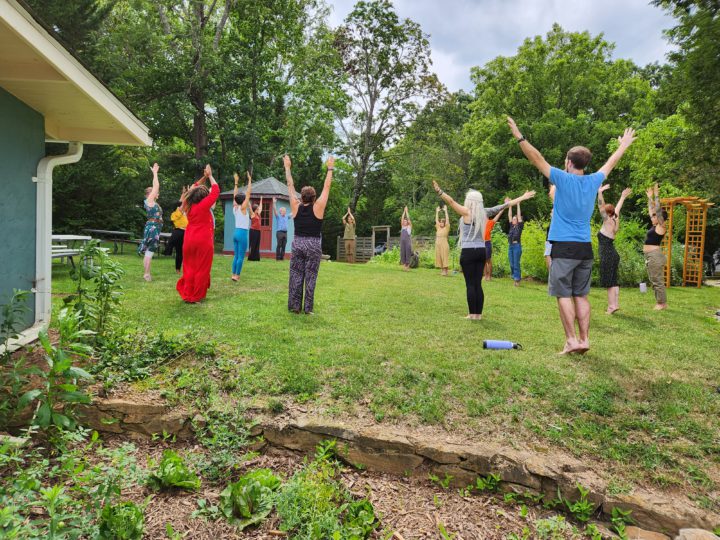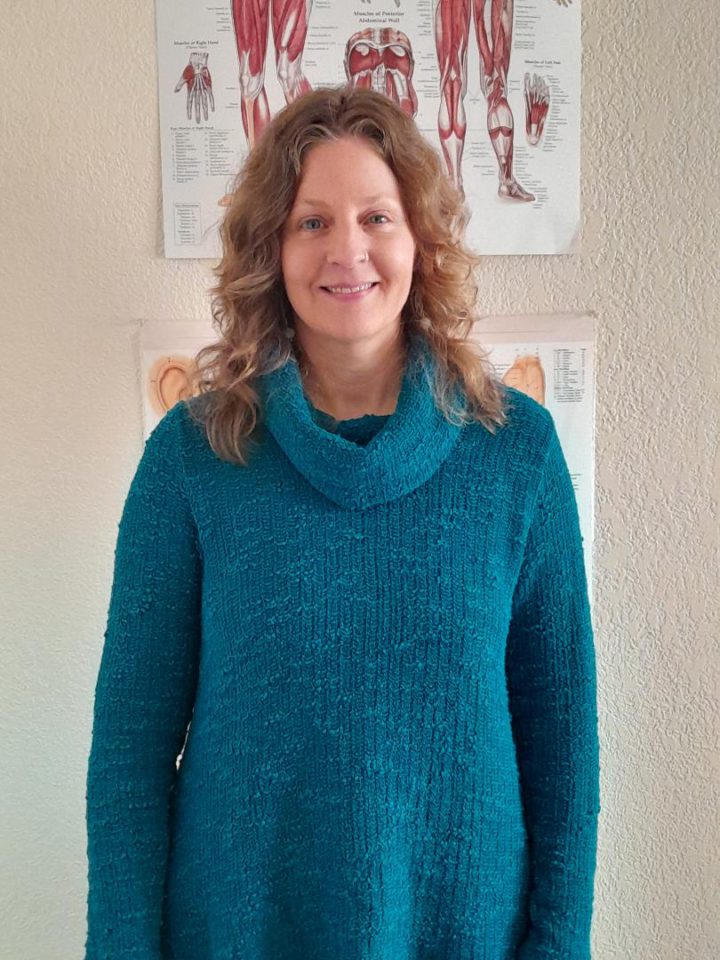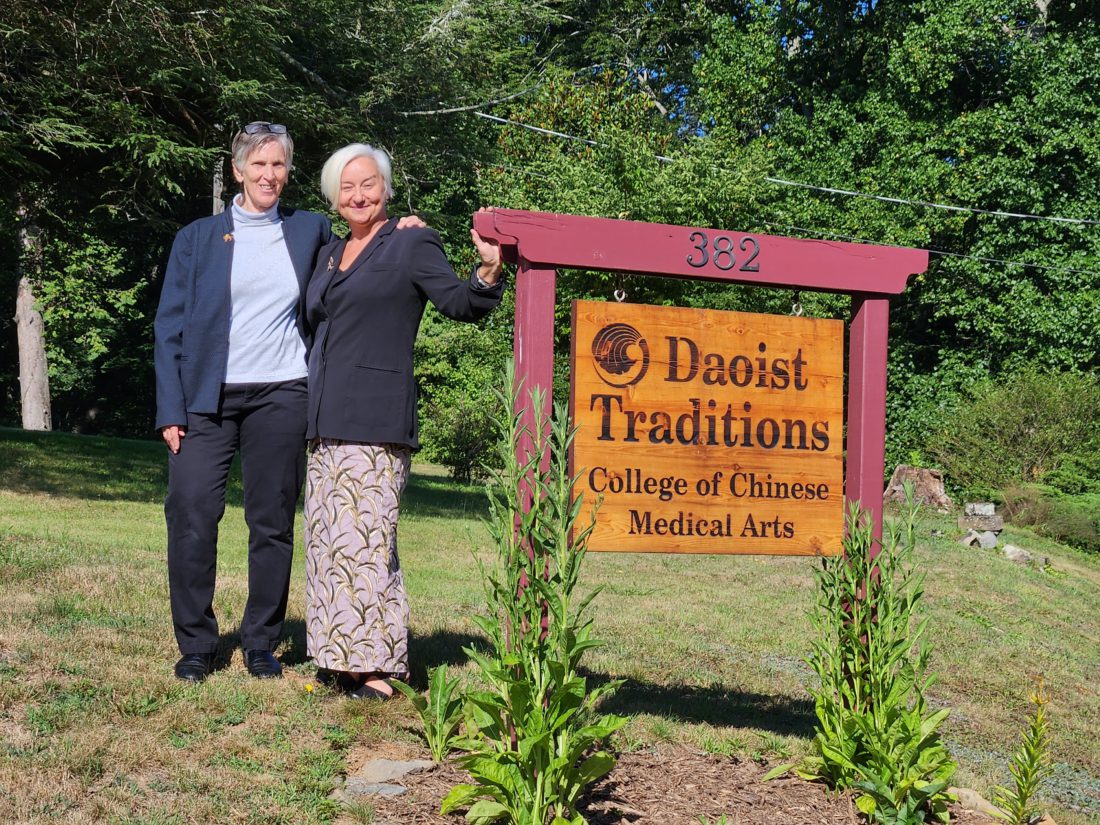The classrooms at Daoist Traditions College of Chinese Medical Arts are spacious and bright — hardwood floors, stone accent walls, natural trim and long windows make the campus look more like a retreat center than a school. On a porch, Adirondack chairs welcome rest and relaxation. Inside, massage tables line a room. Meanwhile, essential oil diffusers and mini-altars adorned with statues and candles sit on tables in quiet corners throughout the campus. In addition to these features, a meditation hut, a labyrinth and a lush garden with over 100 herbs are also on the grounds.
“I don’t know of many student lounges that have a dragon head and drum,” says Stevin Westcott, Daoist Traditions’ communications coordinator, gesturing to a colorful mask in the corner of one room.
The college, which is celebrating its 20-year anniversary, has grown over the past two decades from a single classroom with 10 students to now offering three accredited programs in Chinese medicine and herbology. To date, it has graduated over 280 students.
“We’ve been very fortunate,” says the college’s co-founder and vice president, Rachel Nowakowski, especially when she considers how close the college came to never even getting off the ground.
Chance encounters
In the late-1990s, Mary Cissy Majebé had grown tired of operating The Chinese Acupuncture and Herbology Clinic, which she’d opened in Asheville in 1985. At the time, Nowakowski was working as Majebé’s assistant, along with Junie Norfleet, a fellow future co-founder of Daoist Traditions.
“I kept thinking, ‘If I see one more headache or one more set of menstrual cramps …’” Majebe recalls, trailing off.
No stranger to career shifts — before acupuncture, she was working toward a doctorate in exercise physiology and planning to become an Olympic diving coach — Majebé decided to apply to law school in Atlanta. The school’s condensed schedule would allow her to keep her clinic in Asheville and practice acupuncture to pay her way through school.
That was the plan, anyway.
On a trip to visit her daughter in New York City, Majebé signed up for a two-day class to maintain her acupuncture license. The workshop was led by Jeffrey Yuen, a master teacher of classical Chinese medicine.
Late to the first lecture, Majebé squeezed her way through the packed room to the only available chair, way in the back. Within a few moments of Yuen’s talk (which, depending on who is telling the story, was either about the pericardium meridian or gallbladder meridian), Majebe was hooked. She’d never heard anyone speak about Chinese medicine the way Yuen did. She quickly abandoned her plans for law school.
Back in Asheville, Majebé convinced Nowakowski and Norfleet to attend a two-year course with Yuen. Once the three completed their schooling, they began planning what would become Daoist Traditions. Together with Patricia Bernarding, whose background is in education, the four women established the college in 2003.
“I think the biggest thing after being here for 20 years is we just feel fortunate and grateful,” says Nowakowski. “I mean, [Majebé] tried to veer off course and go into law but came back to Chinese medicine. And when I moved here and started studying, I was like, ‘I don’t know Chinese medicine. Should I move to Florida and become a motorcycle mechanic?’ So, you know, had we chosen differently, we’d have very different lives.”
Classical roots
Nancy Hyton was part of Daoist Traditions’ first graduating class. She now owns West Asheville Acupuncture. Hyton says the school’s classical focus sets it apart from other programs in the country. “It’s a very special school, and I didn’t really realize it when I was going there how special it was. … Daoist Traditions really is trying to preserve this very old lineage of Chinese medicine that predates the modern era,” Hyton explains.
Yuen, an 88th-generation Daoist priest, spent more than 20 years studying classical medicine with other masters. His teachings, rooted in ancient texts and passed down orally from teacher to student, maintain the spiritual and emotional components of acupuncture and expand on different channel systems not normally addressed in traditional Chinese medicine. It was a difference that Majebé felt during those first few moments of Yuen’s New York City lectures and one she’s been able to bring to students like Hyton over the past 20 years.
Nowakowski says Yuen was involved in the early planning and developing of the college’s curriculum, and he still visits the school quarterly to teach seminars and meet individually with students. The classes, which anyone can register for, draw people from all over. Hyton says she still returns to study with Yuen.
In addition to learning Chinese medicine from a living master and studying classical texts, students at Daoist Traditions also participate in self-cultivation — practices steeped in the more spiritual and emotional aspects of the medicine. For students, self-cultivation includes working on campus in the herb gardens, keeping a journal and practicing qigong — movements that incorporate breathwork and meditation for mental, emotional and physical health.

“Becoming a healer is not just from the mind but the heart,” says Westcott, the school’s communications coordinator. He believes Daoist Traditions’ emphasis on self-cultivation makes students more well-rounded practitioners. “This is not just PR, it’s reality — what I’ve seen, what actually happens here,” he adds.
Heather Gagliardi, a fourth-year doctoral student who will graduate from Daoist Traditions in May, says she plans to continue the practice of self-cultivation after graduation. “I think you have to [continue it] for mental and physical health. There’s a lot of burnout in health care,” she says.
On-the-job training
Both Hyton and Gagliardi agree that Daoist Traditions prepares students to practice acupuncture directly after graduation because of the program’s rigor as well as the amount of hands-on clinical experience. Students in the four-year programs complete 3,000 hours of training and 800 hours in the clinic, where they see a minimum of 350 patients over a two-year period. Students start clinical observations in their second year and begin treating patients in teams during their third year. By the fourth year, they’re working with patients on their own. All interns work closely with licensed acupuncture professionals who oversee treatments and are on hand to ask and answer questions.
Hyton says that working in the clinic was her favorite part of the school because it was so interactive. “A lot of critical thinking goes into making a diagnosis in Chinese medicine, which is something that really appealed to me,” Hyton says. “It’s very logical, the way that the diagnosis process works. So I feel like we really got a sense of how to do that in clinic. And we got to see all kinds of people with all sorts of stuff.”
Part of why the clinic attracts people from all walks of life is its relative affordability. Treatments are $40 a session with discounts for veterans, seniors and students. (A typical, private acupuncture session outside of the school costs double that figure, while some practitioners charge over $100 per session.)
And unlike other inexpensive community practice options that sometimes seat groups of people together in a large room, Daoist Traditions’ clinic offers individual sessions in private rooms with massage tables. “We can provide the full experience,” says Peter Shea, clinic director. “We can also use the modalities or adjunct techniques like cupping, gua sha and moxibustion.” (Gua sha is a therapy that involves scraping of the skin, while moxibustion uses bundles of burning mugwort in place of needles to target points on the body.)
Even with COVID-19 restrictions in place over the past several years, the clinic was able to operate successfully, says Shea. The clinic closed in March 2020 but reopened that summer with precautions in place — mandatory masking, air purifiers, additional cleaning equipment and thermometers. The clinic offered heavily discounted sessions to encourage people to return and continued mandatory masking through May 2023 as a precaution.
“We persevered, and people came back,” says Shea. He believes part of the clinic’s success is that it has become so embedded in the local community and because students continue to bring friends, family and referrals to the program.
Health care for all
In addition to offering reduced-price acupuncture at the clinic, Shea says Daoist Traditions continues to look for ways to engage with the local community. Currently, interns offer free acupuncture to patients at Elizabeth House hospice in Hendersonville, as well as to members of the unhoused community at Haywood Street Congregation. They’ve also previously run a booth at the North Asheville Tailgate Market.
“It’s putting [interns] in places where hopefully they’ll be doing some kind of volunteer work in their own communities wherever they move to [after graduation],” says Majebé.
After graduation, Gagliardi plans to move to rural Kentucky and establish a private practice to work with the medically underserved. She says that in rural areas, “Health care is not accessible. Health care is a privilege.”
Kelsey Irvin, a dually enrolled master’s and doctoral student in her third year, says the “ability to meet [the patients] where

they’re at is very important. If you are rigid, you’re not going to be able to help other people.” Irvin, who first experienced acupuncture when she was diagnosed with lymphoma, says she appreciates the practice because it “looks at the entire person, not just the disease.” Acupuncture treatments helped her manage pain and depression, enough so that she was able to lower her medication dosages.
Irvin, who previously worked as a civil engineer, says that after surviving cancer, “I tried to go back to my corporate job and couldn’t. I just didn’t fit there anymore.” Instead, she enrolled in acupuncture school. After graduation, she plans to go back home to Morgantown, W.Va., and use her own experiences surviving a health crisis and the knowledge she gained from Daoist Traditions to connect with patients and give back to the community.
Gagliardi and Irvin both say small class sizes — each cohort is typically about 20 students — allowed them to form friendships and bonds with their classmates and receive individual attention from faculty.
Among that faculty is Majebé. Along with her role as college president, she continues to teach at Daoist Traditions. Meanwhile, she also still runs her own clinic, right across the street from the college. It’s been 25 years since she almost made the switch into law school, but she says the practice of acupuncture is still “fresh and interesting.”
“I’m still learning,” says Majebé. “Chinese medicine is a lifelong learning process. We really tell our students that the main work comes after you graduate. We’re giving you the basics and you’re going to want to get out and start seeing people — that’s when you really learn.”



Before you comment
The comments section is here to provide a platform for civil dialogue on the issues we face together as a local community. Xpress is committed to offering this platform for all voices, but when the tone of the discussion gets nasty or strays off topic, we believe many people choose not to participate. Xpress editors are determined to moderate comments to ensure a constructive interchange is maintained. All comments judged not to be in keeping with the spirit of civil discourse will be removed and repeat violators will be banned. See here for our terms of service. Thank you for being part of this effort to promote respectful discussion.